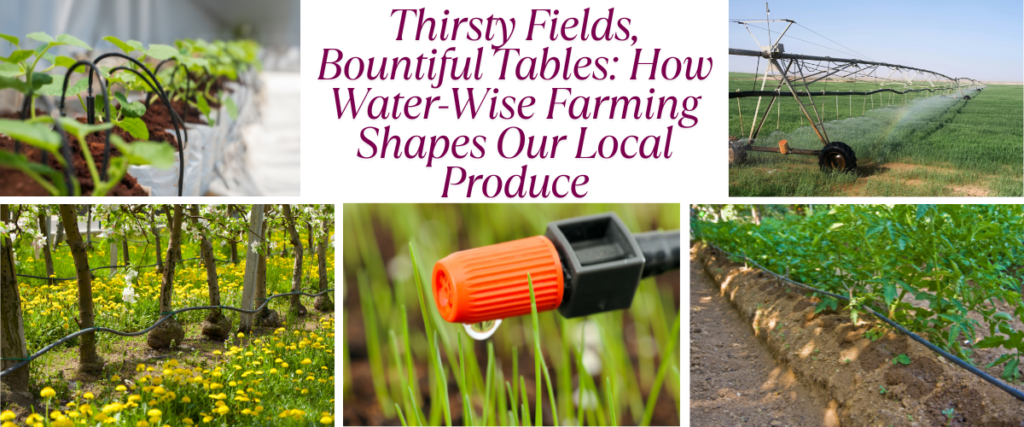Hey folks! Let’s talk about something we all love: fresh, delicious local produce. You know, those juicy tomatoes, crisp lettuce, and sweet berries that make our taste buds sing? But have you ever stopped to think about the journey those goodies take from farm to table? And, more importantly, how much water it takes to get them there?
Water is a precious resource. We know that summers can be scorching and rainfall isn’t always reliable. That’s why the way our farmers manage water is crucial—not just for their crops but also for the health of our entire community and the flavour of what ends up on our plates. Enter water-wise farming.
What Exactly is Water-Wise Farming?
Water-wise farming, also known as sustainable irrigation or efficient water management, is all about using water smartly. It’s about getting the most crop yield out of every drop. It’s not just about conserving water for its own sake but also about ensuring the everlasting healthy soil and the overall ecosystem. Farmers who practice water-wise techniques are becoming stewards of our water resources.
Here are some of the key strategies they employ:
- Drip Irrigation: Forget those old-school sprinklers that waste water through evaporation! Drip irrigation maximises absorption and reduces loss by delivering water directly to the roots of the plants. Imagine tiny, carefully placed pipes gently feeding each plant just the right amount of moisture. This method is incredibly efficient and can reduce water usage significantly.
- Soil Moisture Monitoring: You wouldn’t take medicine without knowing your temperature. Similarly, farmers use sensors to measure the moisture content of the soil. It allows them to irrigate only when necessary, avoiding over-watering. They’re using data to make informed decisions.
- Rainwater Harvesting: Capturing and collecting rainwater is an ancient practice that is making a big comeback. Farmers are building tanks and reservoirs to collect rainwater during wet periods, which they can use during dry spells. It’s like having a savings account for water!
- Mulching and Cover Cropping: Mulch, like straw or wood chips, acts as a blanket over the soil, preventing evaporation and keeping the soil cool. Cover crops are grown precisely to protect and enrich the soil, help retain moisture and improve soil structure.
- Precision Agriculture: This involves using technology like GPS, drones, and satellite imagery to map fields and identify areas that need more or less water. By applying water precisely where it’s needed, farmers can optimise irrigation and reduce waste.
- Choosing Drought-Resistant Varieties: Some crops are naturally more tolerant to dry conditions. Farmers who choose these varieties can reduce their reliance on irrigation. Think of native plants or varieties bred for your specific local climate.
How Water-Wise Farming Impacts Our Local Produce
So, how does all this water-saving wizardry translate to what we find in our local markets and on our dinner plates? Here’s the scoop:
- Better Flavor and Quality: Plants that receive just the right amount of water are healthier and produce more flavorful fruits and vegetables. Over-watering can dilute the natural sugars and nutrients, resulting in bland produce. Water-wise techniques help maintain the perfect balance, leading to richer, more intense flavours.
- Increased Nutrient Density: Water scarcity stress can cause plants to concentrate nutrients and antioxidants as a survival mechanism. It can result in more nutritious produce. Properly managed irrigation avoids harmful stress and prevents the leaching of nutrients from overwatering.
- Extended Growing Seasons: By using efficient irrigation methods, farmers can maintain consistent soil moisture, even during dry periods. It can extend the growing season, allowing us to enjoy fresh, local produce for a more extended period.
- Reduced Reliance on Chemical Inputs: Healthy, well-watered plants are more resistant to pests and diseases. It can diminish the need for chemical pesticides and fertilisers, resulting in healthier food.
- Environmental Sustainability: Water-wise farming helps conserve precious water resources, reduces soil erosion, and minimises pollution. It’s a win-win for both farmers and the environment.
- Supporting Local Economies: When farmers adopt sustainable practices, they invest in the long-term health of their farms and our communities. It supports local economies and ensures we have access to fresh, healthy food for generations to come.
- Resilience against Climate Change: Water-wise farming becomes even more essential as climate change brings more frequent and intense droughts. By implementing these strategies, farmers may increase their resilience and ensure they can continue producing food even under challenging circumstances.
What You Can Do
As consumers, we also have a role to play in supporting water-wise farming:
- Buy Local: Choose produce from farmers who practice sustainable irrigation. Look for labels like “certified organic” or “sustainably grown.”
- Ask Questions: Don’t hesitate to ask your local farmers about their water management practices.
- Reduce Food Waste: Wasting food also wastes the water used to grow it. Plan your meals, store food properly, and compost scraps.
- Conserve Water at Home: Every little bit helps. Use water-efficient appliances, fix leaks, and water your garden wisely.
Conclusion
Water-wise farming is more than just a trend; it’s a necessity. It’s about ensuring access to fresh, healthy food while protecting our precious water resources. By supporting farmers who adopt these practices, we’re investing in a sustainable future for our communities and enjoying the delicious bounty of our local land. The next time you savour a succulent piece of local fruit or vegetable, take a moment to appreciate the journey it took and the farmers who are working hard to bring it to your table.
Disclaimer
This blog post’s content is intended solely for general education and informational purposes; it is not intended to be used in place for expert guidance. The specific water-wise farming practices farmers use may vary depending on their location, crop type, and other factors. You should confer with local agricultural experts or extension services for specific guidance on water management in your region. The results and impacts of water-wise farming may also vary. The above blog post is based on publicly accessible information and should not be considered a substitute for professional advice.


